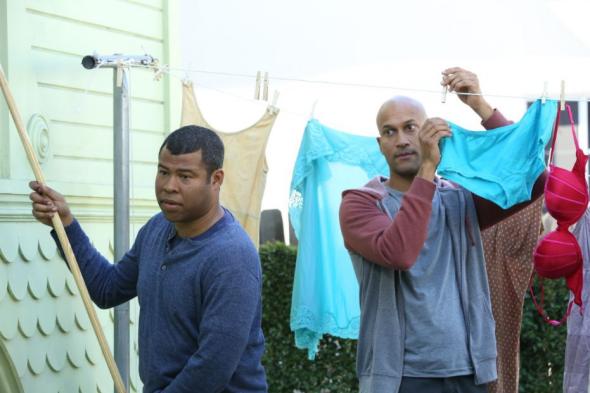Key & Peele’s Latest Season Has a Feminist Bent

Comedy Central
In the past two years, Comedy Central has become a kind of haven for funny women being funny about lot of things, most notably about being women. This past season alone, Amy Schumer has had viral sketches about actresses’ “last fuckable day,” booty anthems, and football rape culture—and that was just in the first episode. There are also the ladies of Broad City who have brought a female-centric perspective to the stoner-buddy comedy, a genre that’s typically dominated by men.
It seems like the men might be catching on, Key & Peele included. Last year, Indiewire’s Sara Stewart wrote about what she called the show’s “lady problem”: Like most critics, she glowingly praised their race-based comedy and their straight-up silliness, in this case to highlight how terrible their sketches about women are in comparison. (On the flip side, Schumer has been lambasted for her “shockingly large blind spot about race.”) Meegan, Key & Peele's cartoonishly needy girlfriend, and the viral “I Said Bitch” sketch, about men who are scared of their girlfriends, both feel stale—appearing to laugh at women more than with them.
But based on the first three episodes of Key & Peele’s fifth season, which premiered Wednesday night, the show’s writers seem to be thinking about its lady problem as well. Episode 1 introduced an anger translator for Hillary Clinton—a counterpart to President Obama’s anger translator, Luther, who is so popular he made an appearance with the real Obama at the White House Correspondents’ Dinner. Later in the episode, a pirate shanty that starts out sounding like it’s about pirates raping women turns into a shanty about women’s rights—the refrain is “We say yo-ho, but we don’t say ho, because ho is disrespectful yo.” It’s a simple conceit, and each song is short and delightful. The sketch feels so much like something Amy Schumer might do that when the captain turned out to be a woman, I half-expected it to be her.
Get More: Comedy Central,Funny Videos,Funny TV Shows
The second episode (spoiler alert—it doesn’t air until next week) features a TED–like conference with a session on “menstruation orientation,” about how men should deal with their women when they have their period. Blood flowing from a woman’s vagina is likened to locusts swarming out of a man’s penis: “That’s some biblical shit.” The sketch comfortably straddles the line between making fun of clueless men (there’s a demo on how tampons work) and familiar “this is how you handle women” comedy. (Episode 3, alas, brings the return of Meegan.)
Key and Peele are so scathing and thoughtful about race that it hardly seems as though they should always have to hit it out of the park on women. No comedian can be all things to all people—nor should he or she have to be. But the truly talented ones seem to be learning from their mistakes.
